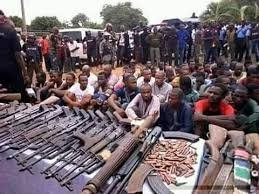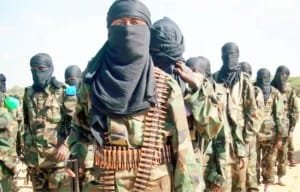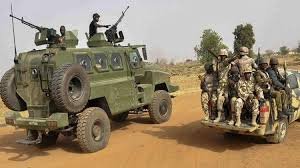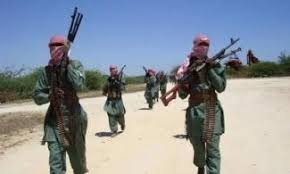Kwara State — long seen as one of the quieter corners of Nigeria’s North-Central region — has now been thrust into the eye of the storm. A shadowy terror group, known as the Mahmuda Group, has surfaced, dealing yet another blow to Nigeria’s fragile security architecture already buckling under the weight of Boko Haram insurgency and rampant banditry.
With every passing day, this new threat underscores a grim reality: terrorism in Nigeria is not only surviving — it’s evolving and spreading. Against the backdrop of the Long War against Terrorism in the entire northern region of Nigeria, Hussaini Kafi in Kano who while assessing the gripping threats occasioned by the terrorists’ activities opens fresh fears, raises a critical question whether the jihadist wars being created by the extremist groups are stuck with the region.

Who are the Mahmuda Group?
Little was known about the Mahmuda Group until early 2025 when reports of their chilling attacks began to trickle in from rural Kwara communities. Security experts describe them as a fast-rising extremist group blending the brutal tactics of jihadist insurgencies with the guerrilla strategies typical of armed bandits.
Their operational footprint is still expanding, but what’s clear is their objective: to carve out territories where their extreme ideology can reign unchallenged.
Sources suggest the Mahmuda Group was born out of splinter cells from existing radical outfits. Dissatisfied with leadership struggles in older jihadist groups, Mahmuda’s founders sought new hunting grounds — and Kwara’s under-defended spaces offered a perfect opportunity.
Their Root and Dangerous Ideology


Analysts say Mahmuda Group’s ideology is a familiar yet lethal blend: militant Islamism combined with anti-state rhetoric. Like Boko Haram and ISWAP before them, the Mahmuda Group envisions a society stripped of Nigeria’s secular structures and rebuilt under a harsh interpretation of Sharia law.
Yet, they differ slightly in strategy. Instead of mounting massive assaults on military formations as Boko Haram traditionally does, Mahmuda’s approach is more insidious: ambushing rural communities, imposing illegal taxes, indoctrinating youth, and gradually eroding state control — village by village.
Their extremism is designed to be sustainable, built on fear and the strategic capture of unprotected areas.
Who Leads the Mahmuda Group?
As of now, the leader of the Mahmuda Group remains shrouded in mystery. Intelligence reports have yet to pin down a name or face — a testament to the group’s sophisticated operational secrecy.
Unlike earlier insurgent leaders who sought fame through videos and online propaganda, Mahmuda’s leadership seems intent on operating under a veil of invisibility, making it exponentially harder for security forces to disrupt their growing influence.

Security insiders, however, suspect that the group is commanded by a cadre of former mid-level Boko Haram commanders who splintered off in search of new conquests.
Trail of Blood: Mahmuda Group’s Deadly Impact
Since their emergence, the Mahmuda Group has unleashed a terrifying wave of violence across Kwara State:
Number of Attacks: At least 15 confirmed assaults on villages and security outposts.
Death Toll: More than 87 civilians and security personnel have been killed.
Destruction: Numerous schools, healthcare centers, and local government offices have been razed.
Casualties: Hundreds have sustained serious injuries, and thousands have been displaced, seeking refuge in neighbouring states.

The group’s methodical targeting of critical infrastructure — clinics, farmlands, and schools — aims to paralyze local governance and force communities into submission.
An Already Wounded North Bleeds Further
Northern Nigeria has been battling terrorism for over a decade. The Northeast groans under the weight of Boko Haram and ISWAP insurgencies. The Northwest suffocates from relentless banditry. Now, the North-Central region — particularly Kwara — is under fresh assault.

The implications are chilling: a nation already struggling to contain two fronts must now stretch its thin resources even further. If unchecked, Mahmuda’s operations could link up with bandit groups from the Northwest or jihadist cells from the Northeast, creating a sprawling network of terror across the entire northern half of Nigeria.
Security analysts warn that if Kwara falls into deeper chaos, it could trigger a domino effect across nearby states like Kogi, Niger, and even down to parts of the Southwest.
The Proliferation of Terror Groups: A Dangerous Trend
The Mahmuda Group’s rise is not an isolated incident. Nigeria’s north has seen a worrying explosion in the number of armed groups over the past decade.
In the Northeast, Boko Haram and its ISWAP offshoot continue to wage war, displacing millions and turning entire villages into ghost towns.
In the Northwest, bandit groups have mutated into quasi-terrorist organizations, running extortion rackets and enforcing their rule with brutality.
Now, the North-Central region faces its own nightmare.

New groups like Lakurawa have similarly emerged, masquerading initially as community defenders before morphing into bloodthirsty militias.
What’s more, these groups are increasingly sophisticated — leveraging drone technology, satellite phones, and cross-border alliances to evade capture and amplify their terror campaigns.
Three Northern Regions Under Siege

It is no exaggeration to say that terrorism has engulfed the North:
Northeast: Despite military gains, Boko Haram recently bombed a civilian bus in Borno State, killing eight and injuring several others.
Northwest: Armed men stormed a mining site in Zamfara, slaughtering at least 20 miners in a brutal daylight attack.
North-Central: With Mahmuda Group’s attacks spreading in Kwara, the North-Central corridor is now firmly in the terrorists’ crosshairs.
This tri-regional crisis is dragging Nigeria into what some experts are calling a “long war” — a slow, grinding conflict that could last decades if left unchecked.
Government Response: Fighting Shadows
In response to these growing threats, the Nigerian government has launched military offensives under operations such as Operation Hadin Kai in the Northeast and Operation Accord in the Northwest.
However, gaps remain.

While the government scores occasional victories — killing or arresting dozens of terrorists — these successes are often fleeting. Groups like the Mahmuda Group thrive in the absence of sustained, community-driven counterterrorism strategies.
Governor Babagana Zulum of Borno State recently sounded the alarm, warning that Boko Haram is “making gains again” and called for a more technology-driven warfare strategy, including drones and satellite surveillance.

Similarly, security experts are urging a shift away from reactive tactics toward proactive measures — cutting off terrorist financing, improving governance in rural areas, and launching deradicalization programs before the next generation falls prey to extremist recruiters.
Conclusion: A Nation at a Crossroads
The emergence of the Mahmuda Group is a stark reminder that Nigeria’s fight against terrorism is far from over — it is entering a dangerous new phase.
Without urgent action — and a shift in strategy — more groups like Mahmuda will rise, feeding off poverty, corruption, and political neglect.
The cost of inaction is clear: more bloodshed, more displacement, and the slow unraveling of Nigeria’s northern heartland.
If Nigeria is to win this war, it must be willing to confront not just the symptoms, but the root causes of extremism — before the flames of terror engulf the entire nation.



